If you are applying for a loan and your lender requires a CPA letter to confirm your income, employment status, or self-employment, you are in the right place.
CPA Letter for Self Employed or Business owners needs a CPA letter for mortgage lender
CPA Letter Plus for Business Partners, Self Employed Individuals need a CPA letter with Notarization

Click the "Request" button to place your order easily.

Complete the checkout process to confirm your order.

Fill out the form after checkout and get live portal access.

You are all done, CPA will write your letter in 2 hours.
If you are a business owner, employee, or self-employed professional, you may be asked by mortgage lenders, banks, or landlords to provide a CPA letter confirming or estimating your income. Such requests often come up during loan applications, lease agreements, or when buying a home. Below, you’ll learn what a CPA letter is and how professional CPA letter services can assist you.
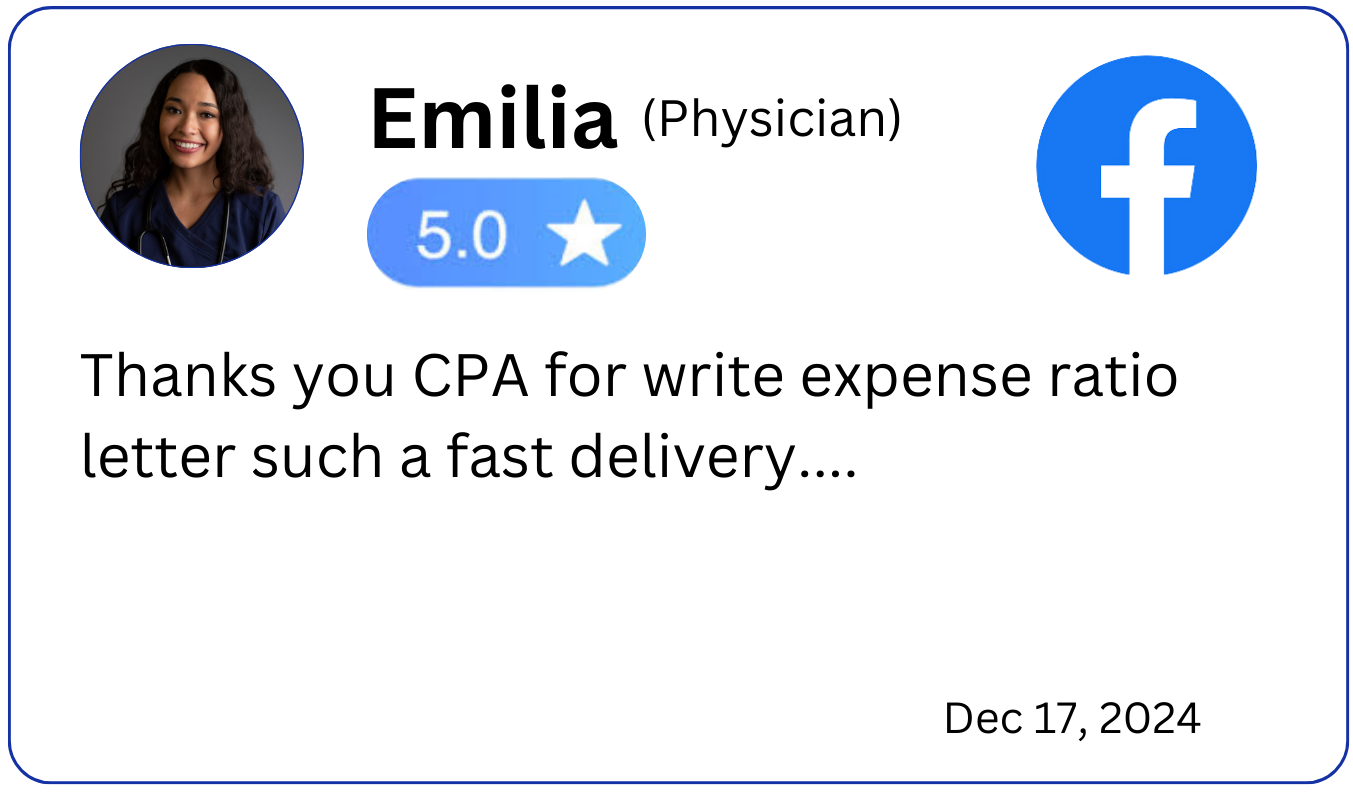

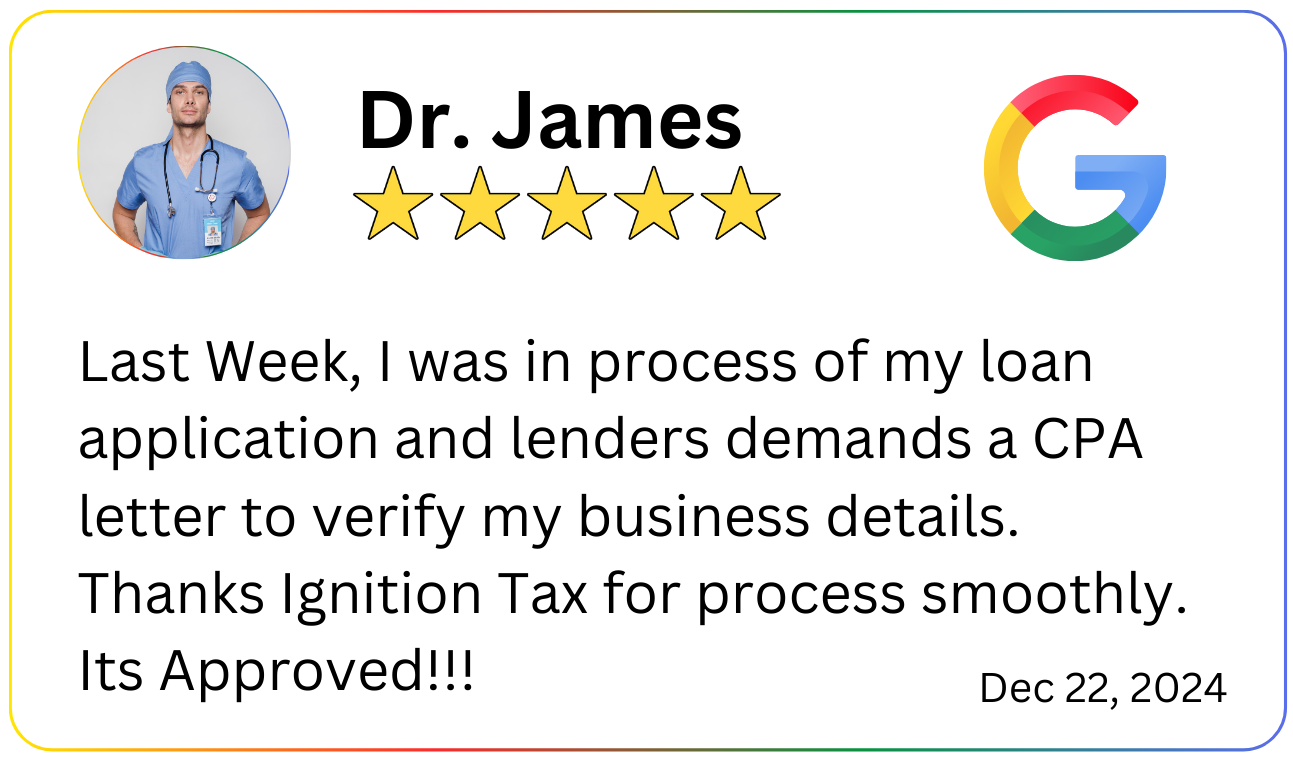

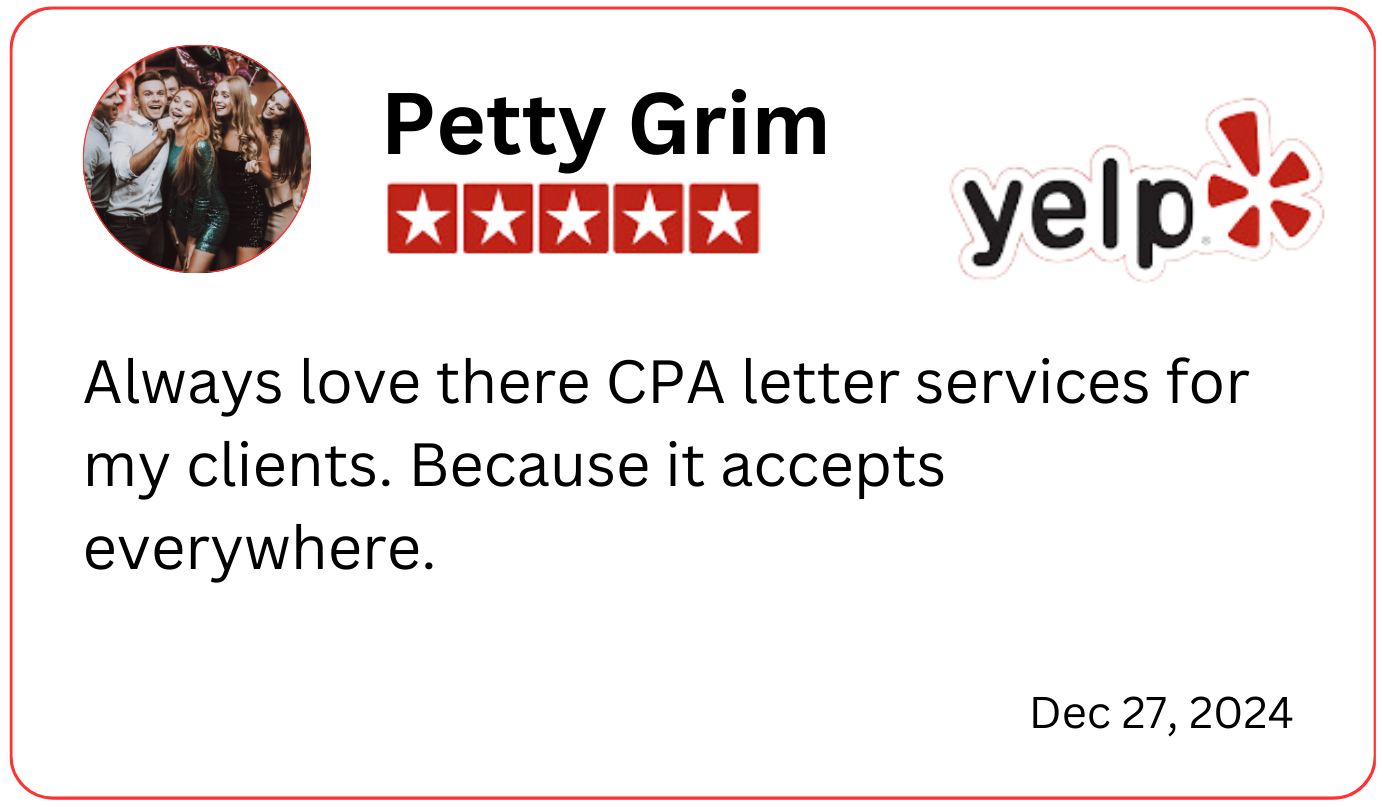
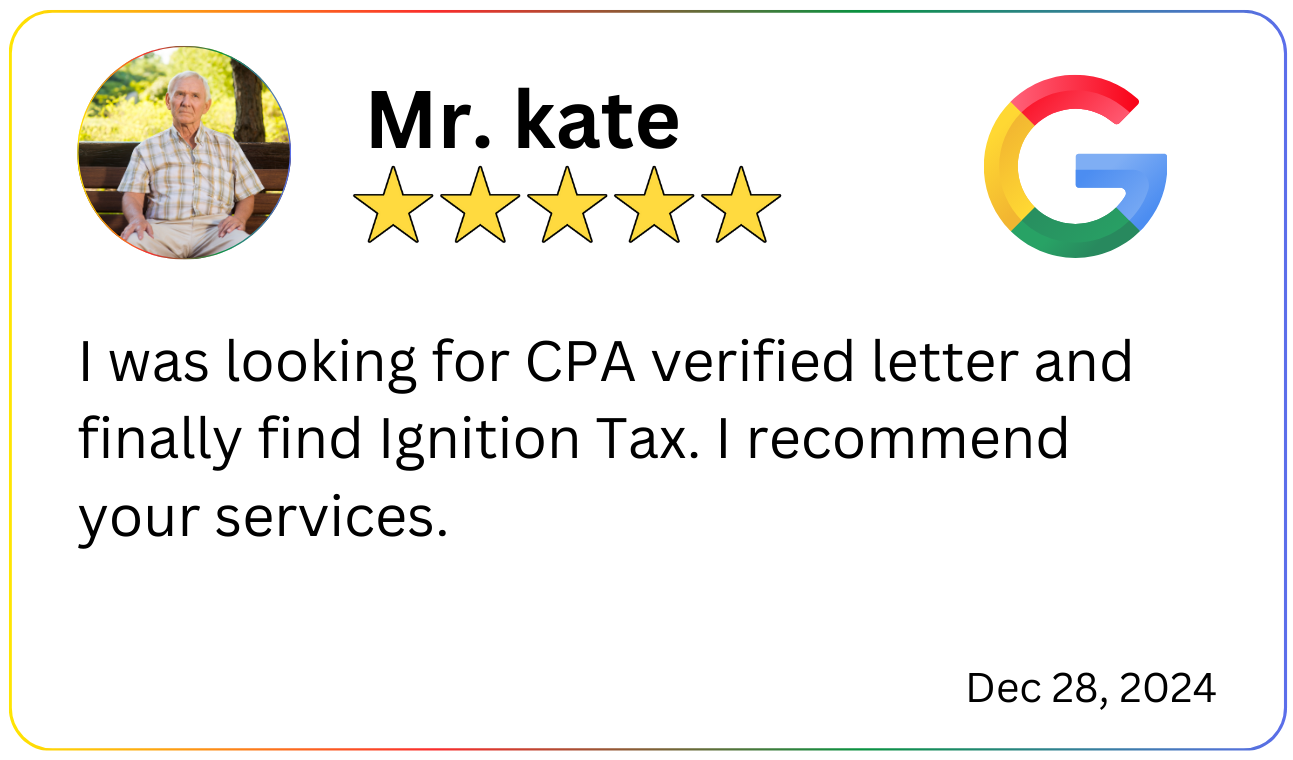
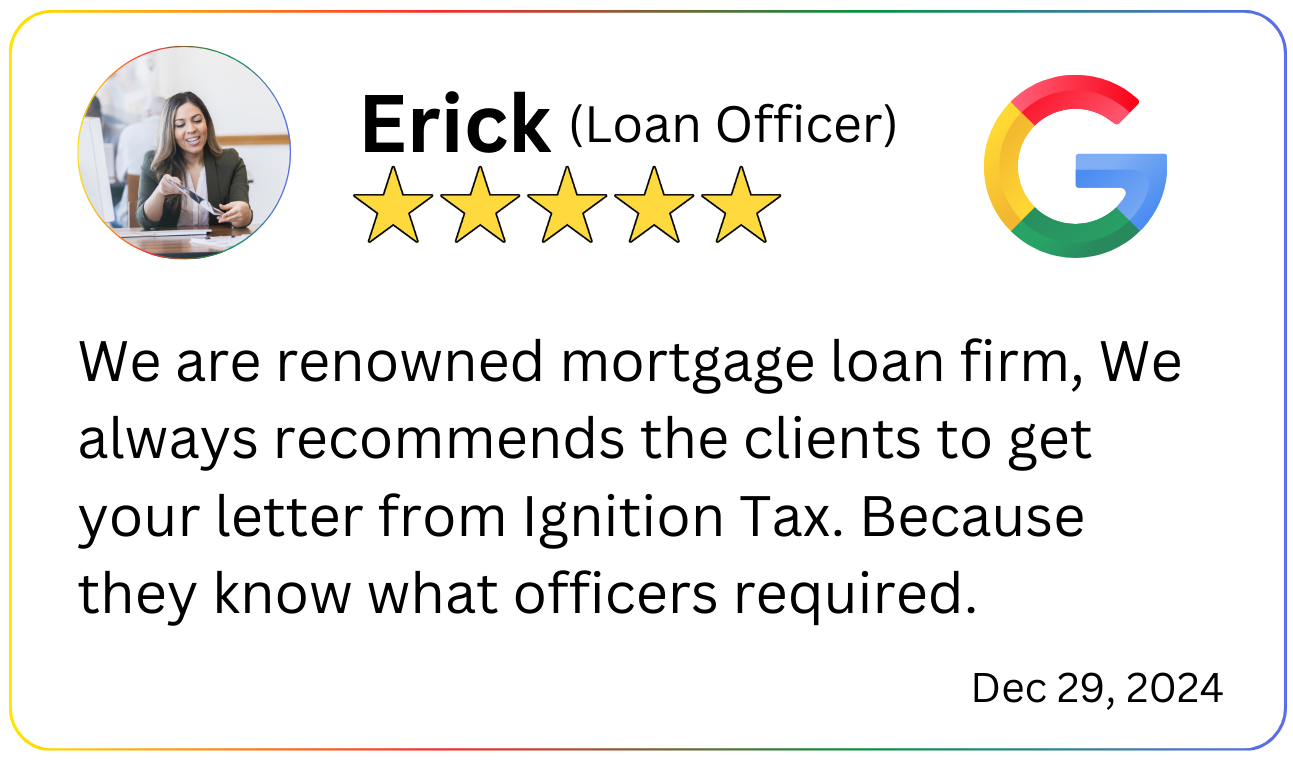



Ignitiontax prepares CPA Letter services for the United States. Scope is clear. We verify income and facts from tax returns, bank statements, and financial statements. We align wording to lender and landlord checklists. For self-employed clients, most mortgage programs expect one to two years of federal tax returns. Fannie Mae and Freddie Mac outline these documentation rules.
We follow AICPA(American Institute of Certified Public Accountants) guidance for third-party verification and comfort letters. We state what was checked. We avoid assurances outside CPA standards.

Banks or lenders require a CPA letter to verify your financials or business status for loan approval.
Prepared for mortgage brokers, banks, and refinancing. We align with agency documentation rules for self-employed borrowers—typically one to two years of signed federal returns, with program variations. We reflect the verified figures and the period covered.
The letter can support: income stability notes, business existence, and source-of-funds or use-of-business-funds confirmation when requested. We coordinate delivery to the lender and include lender name, address, loan number(if provided), and the borrower’s consent.

A CPA writes a letter confirming your earnings for various purposes, ensuring accurate income verification.
For lenders, landlords, and banks. We confirm income using IRS(Internal Revenue Service) tax returns, year-to-date P&L, balance sheet, and bank statements. Letter includes client name, business entity(if any), time in business, method used, and signature on CPA letterhead. Many landlords accept a CPA letter as proof of income along with tax returns and statements.
Use cases: mortgage pre-approval, apartment application, lease renewal, line of credit, and underwriting re-verification. We tailor the cpa letter sample to the recipient’s template when provided.

Need to verify your business expense ratio? This letter, requested by lenders or banks, confirms your working expenses.
Some lenders and landlords ask for an expense ratio.
We calculate the expense percentage from your income statement and supporting records.
The letter states the period covered, method used, key components, and limits.
It does not replace audited financial statements. It gives the recipient a concise expense view linked to actual records.

Looking to lease or rent an apartment? A CPA can write a letter verifying your status for tenant or lender needs.
Landlords and property managers want reliable income verification.
We prepare a CPA proof of income letter that pairs with tax returns, bank statements, or a current P&L (profit and loss).
Letters include recipient name, property address if available, period covered, and CPA signature on letterhead. Delivery can go directly to the leasing office upon your consent.

Certify your self-employment status with a CPA letter, ensuring 100% approval for your needs.
This CPA letter is built for sole proprietorship and small business owners. It addresses self-employment income, expense patterns, and business stability.
Most mortgage programs require one to two years of signed federal tax returns for self-employed borrowers. We align the letter with the figures under review.
Self-employment is common. In Q4 2023, 9.1 million unincorporated self-employed workers represented 5.7% of nonagricultural workers. Lenders often need third-party confirmation for this group.

Own a business? A CPA will write a letter confirming your business name, status, and ownership.
Lenders often ask for a “use of funds” confirmation.
We issue a CPA letter that states the intended use: down payment, closing costs, line of credit, equipment purchase, or working capital.
We reference the source of funds and relevant financial records.
We confirm the transaction is recorded within standard accounting practices and consistent with the business purpose.
If policy language is required, we align wording to the lender’s checklist and program rules.
This letter supports underwriting for business loan, line of credit, mortgage, or refinancing.
We include recipient name, loan number(if provided), period covered, and CPA signature.
When requested, we add a brief statement on solvency indicators tied to financial statements—without providing an audit opinion.

A CPA can write a letter to meet your unique needs, whether legal, professional, or other purposes.
We start every project with a CPA engagement letter.
It defines scope, deliverables, timeline, and fees.
It explains responsibilities: client, lender, and CPA.
It covers confidentiality, data access, and record retention.
It states liability (financial accounting) limits and indemnity terms.
It references applicable standards: AICPA(American Institute of Certified Public Accountants) and state board rules.
You receive clear terms before work begins—no surprises.
Use cases: income verification, CPA comfort letter, CPA 3rd party verification, CPA expense ratio letter, and CPA letter of explanation.
Entities included: client name, business entity, recipient, purpose, and consent for third-party delivery.

We reference documents examined and calculations made. We do not provide an audit opinion or guarantee loan performance.
We explain procedures performed and the limits of our work. We reference documents examined and calculations made. We do not provide an audit opinion or guarantee loan performance. Our language follows AICPA comfort-letter guidance and third-party verification practices to reduce misinterpretation and risk.
Common requests: confirmation of self-employment, business existence, revenue methods, and expense ratio notes. When a requester asks for assertions beyond CPA standards, we propose acceptable wording instead.

A CPA can write a letter to meet your unique needs, whether legal, professional, or other purposes.
We issue a CPA verification letter to third parties. Banks, insurance carriers, mortgage brokers, and creditors use it to confirm facts.
Scope is defined. We confirm items we can support with tax returns, financial statements, and bank statements.
Typical requests: self-employment status, time in business, business existence, revenue method, and use of business funds.
Language follows AICPA(American Institute of Certified Public Accountants) guidance for comfort letters and third-party verifications. We explain procedures and limits to avoid misinterpretation.

A CPA can write a letter to meet your unique needs, whether legal, professional, or other purposes.
Underwriting flags unusual items. We provide a CPA letter of explanation to add context.
Use cases: large year-over-year changes, seasonal revenue, one-time expenses, or a recent entity change.
We reference source documents and calculations. We avoid legal advice.
Our goal is clarity for credit risk review and a direct link to the loan file.

Your letter appears on CPA letterhead with signature, seal, and notarial acknowledgment. We confirm identity, date, and capacity.
Some recipients require a notarized CPA letter.
This occurs with certain state forms, lenders, and adoption or immigration files.
We coordinate a commissioned notary.
Your letter appears on CPA letterhead with signature, seal, and notarial acknowledgment.
We confirm identity, date, and capacity.
Scope remains the same: we verify facts from tax returns, financial statements, and bank statements.
We do not provide legal advice.
Common requests: mortgage packages, apartment rentals, business licenses, insurance, and creditor files.
Ask for a notarized option when the checklist mentions “notary,” “acknowledgment,” or “jurat.”

This letter, required by lenders or tenants, certifies your employment status, tenure, and wages.
A CPA letter for a mortgage verifies a borrower’s financial information. This letter is mostly requested by lenders to confirm the accuracy of an individual’s income, assets, and financial health at the time of applying for a mortgage loan.
A CPA Letter confirms an individual’s or Business income at the time of applying for loans, mortgages, or rental properties. It is requested by the lender to verify the applicant’s monthly or yearly income. This sort of letter assures the lender about the repayment of the loan. Mostly requested for self-employed individuals or those with irregular income streams.
A CPA letter to certify an applicant individual’s self-employment status and income. This letter is mostly requested by lenders and landlords. The main purpose is to assure the income and the stability of a self-employed person’s business.
It is a letter provided by a Certified Public Accountant (CPA) to verify a tenant’s financial status, usually required by landlords or property managers during the rental application process. This letter confirms the tenant’s income, employment status, etc.
A CPA comfort letter that confirms certain financial or accounting positions of an individual or business. It is used in multiple situations, such as at the time of mortgage loan, Yearly audits, or during business transactions. The letter offers a level of comfort and assurance to third parties, typically lenders or investors, by providing a validation of financial information.
A CPA letter for the withdrawal of business funds is a statement that CPA mentioned on the letter along with the business details. The purpose of this letter confirms to the lender that withdrawal of funds from a business will not negatively affect the business operations or stability.
A CPA letter for the use of business funds is also a statement that certifies the bank or lender that use of business funds will not harm or affect the business.
A CPA letter is required by lenders or other third parties to confirm the accuracy of financials of a borrower or client, especially when applying for loans, mortgages, or other financial transactions.
A CPA letter to validate the accuracy and completeness of a client’s financial statements, such as profit and loss statements and balance sheets. This letter is required for businesses seeking to reassure investors, lenders, or other stakeholders of the reliability of their financial records.
A CPA letter confirms an individual’s employment status and income. This letter is commonly requested by employers, lenders, or other entities that need to verify a person’s employment status and income level.
A CPA letter of business existence is an official document issued by a Certified Public Accountant (CPA) that confirms the existence and operational status of a business. CPA verifying the business name, address, ownership on the letterhead. It can be requested by banks, lenders, or other entities to verify that a business is legally registered and active on the location.
A CPA letter verifies and details a business’s assets. It’s commonly needed for securing loans, attracting investors, or during mergers and acquisitions. The letter confirms the value and existence of assets like equipment, inventory, real estate, and intellectual property.
While every CPA letter is unique, most of the letters include the details like Name, Address, Business nature of the applicant.
A valid CPA letterhead contains the details like name, address, License,Company Logo of the active Certified Public Accountant.
It includes the full legal name of the Person who is requesting this letter.
The details of the business are required to be mentioned on the CPA letterhead to Certify the business, Income, ownership percentage, etc.
In the case of Sole Proprietor, applicant name and address will be mentioned on the letter.
The contact of the applicant is to be mentioned on the letterhead to keep in record of the Certified Public Accountant and third party.
Percentage of ownership shows how much of a company or asset someone owns. It indicates their share of control over the company’s equity, usually given as a percentage of the total.
Example: Emily owns 40% of a small tech startup, meaning she has a 40% stake in the company. This percentage gives her a corresponding share of the company’s profits, voting rights, etc.
The CPA letters describe the nature of a business, what a company does and its primary activities. It outlines the core operations, products, or services that define the business.
Example: A bakery’s nature of business is to bake and sell fresh bread and pastries, serving local customers with a focus on high-quality, homemade baked goods.
The CPA letter should include the exact number of years or the date since the applicant has been working or owned the business.
Example: Mr. John Doe Smith has been in business as the sole proprietor since 07, July 2021.
The lender requested the applicant to provide a letter to verify the Employment status and Income of the Applicant.
Example: Mr. David worked as Director of Finance at Abc Marketing, Inc.
This statement is requested by the lender to specify from how long the CPA has been preparing the applicant’s tax returns.
Example: Mr. Eric Holland, CPA has prepared and Filed the tax return of “Applicant” for the year 2023..
This statement on CPA letters is requested by the lender at the time of loan process. It verifies that CPA has reviewed the Financials or Tax Return of the applicant.
CPA letter must have a signature from Licensed CPA whether independent or working for an accountancy firm.
The letter can not be considered as validated until the CPA complete name, Licence number and address mentioned on the letter.
A CPA letter is a document from a Certified Public Accountant that confirms your financial status or details. It’s often needed to reassure lenders or landlords about your financial reliability..
A CPA letter costs $199 for basic letter and $249 for letter plus. Both options include unlimited revisions until your loan is approved.
It covers income verification, self-employment status, and ownership percentage. For business partners, it also includes financial statement verification and details on how business funds are used.
After placing order, you’ll recieve your letter in 2 to 3 hours.
Lenders use CPA letters to verify that you have a stable income and are financially sound enough to repay a loan.
You can get a CPA letter from your current CPA or through Ignition Tax CPA’s. They can provide the verification you need based on your financial documents.